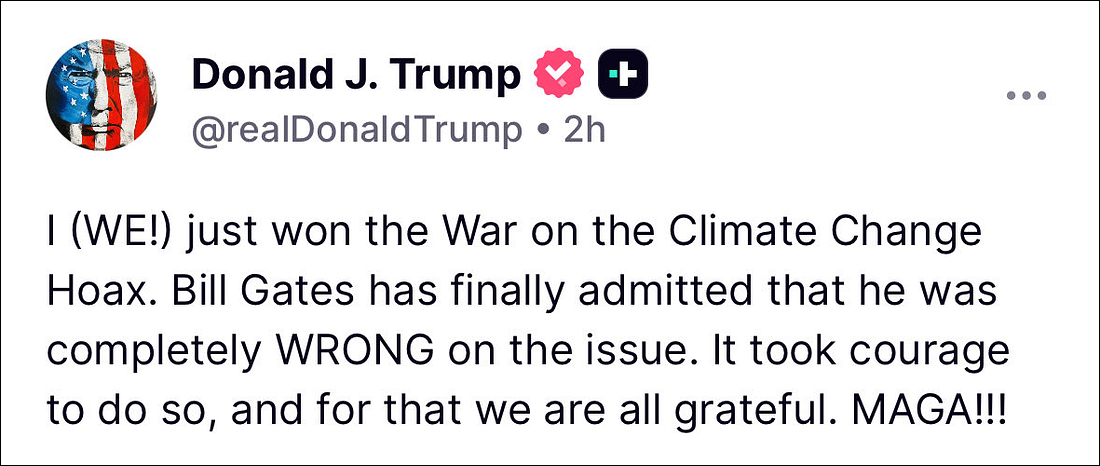|
Bill Gates Shakes Up the Climate Discussion
It is not just his three truths, but the fact that he said them out loud
Yesterday, in his periodic letter to the world, Bill Gates shared three truths about climate change — and shook up the climate discussion. While the longer term implications of his letter are uncertain, early signs are that Gates has injected a welcome dose of climate realism into the discussion.
Here are his three truths (and I encourage everyone to read his whole letter):
Climate change is a serious problem, but it will not be the end of civilization;
Temperature is not the best way to measure our progress on climate;
Health and prosperity are the best defense against climate change.
For most THB readers, these truths will be well understood, even common sense, and will seem neither shocking nor scandalous.
But for some steeped in climate advocacy grounded in visions of “existential threat” or a looming apocalypse, Gates’ truths have rocked their world.
Some examples from the activist media:
CNN: “a stunning claim”;
Politico: “soft pedals climate”;
Axios: “escalates debate with scientists”;
The New Republic: “we shouldn’t be listening to people like him”
Activist climate scientists joined their fellow-traveling media critics, criticizing the substance of Gates’ letter or expressing concerns that their political enemies might welcome it — Here are a few examples:
Michael Mann: “This is horrifying . . . [climate change] represents an existential threat, exacerbating global security threats, threatening water and food supplies, leading to massive damage. . . it’s like a game of soft climate denial bingo”;
Jonathan Foley: “I stopped listening to Bill Gates years ago. You should stop too”;
Michael Oppenheimer: “{h]is words are bound to be misused by those who would like nothing more than to destroy efforts to deal with climate change.”
Of course, at the other end of the spectrum, there is President Donald Trump, who posted the following, which is just as over-the-top as the reactions from climate activists:
Just like the climate activists, President Trump is treating the letter as an ink blot for political messaging, rather than on its own merits.
I suspect the president does not agree with this statement by Gates:
“Climate change is a very important problem. It needs to be solved, along with other problems like malaria and malnutrition.”
From my perspective, Gates’ letter is a welcome contribution to a growing chorus of climate realism and energy pragmatism.
I’ve been asked by several people if I think Gates reads THB or my work — I doubt it, or else he wouldn’t have made a big mistake in his letter suggesting that extreme climate scenarios are today implausible due to climate policy successes. They are implausible because they were always wrong about coal.
I’ve never met Gates, but Bill should definately read THB!
Yesterday, as I settled into my seat for the flight back from Florida (where I spoke at New College) I was invited on very short notice to write an op-ed for the NY Post on Gates letter. I wrote it on the plane and sent it in somewhere over Oklahoma.
I reproduce the op-ed in full below. You can read it at the NY Post site here.
Why Bill Gates turned on the alarmists, and decided climate change isn’t the apocalypse (NYP title)
Earlier this week, Microsoft co-founder and billionaire philanthropist Bill Gates dropped a truth bomb into the discussion of climate and energy policy. His missive sent the climate lobby into a tizzy as he joined a growing chorus of voices aligned with today’s science and policy consensus on climate.
Gates actually shared three truth bombs, and let’s take a look at each.
Truth #1: Climate change is a serious problem, but it will not be the end of civilization
Here Gates recognizes that the most extreme projections of future climate change have been dialed back considerably over the past decade. Gates explains correctly, “the current consensus is that by 2100 the Earth’s average temperature will probably be between 2°C and 3°C higher than it was in 1850.”
This consensus has rapidly emerged not because the world has rapidly reduced emissions (as Gates incorrectly asserts), but rather because scientists have recognized that those extreme scenarios that have dominated climate research and policy were actually off target from the start.
Specifically, in work pioneered by my colleague Justin Ritchie of the University of British Columbia almost a decade ago, we now know that the previous generation of climate scenarios foresaw a world rushing headlong into coal energy to power the world.
Coal is the most carbon-intensive fossil fuel and a global energy system dominated by coal would indeed have had massive emissions with correspondingly largest effects on climate.
In reality, rather than in models, our research shows the world is not rushing into coal and the scenarios that projected as much as a six-fold increase in coal consumption are already implausible. The real world has already departed substantially from these projections.
In recent years, projected global temperature increases to 2100 have been successively revised downwards. Earlier this month the Norwegian group DNV issued its “most likely” projection for global temperatures this century to be a 2.2C increase and achievement of net-zero emissions by the 2090s.
These achievements would not hit the targets of the 2015 Paris Agreement under the U.N Framework Convention on Climate Change, but they are far from a global existential threat, according to the projections of the Intergovernmental Panel on Climate Change.
The new consensus is so robust that those taking Gates to task on this point might be considered today’s new climate deniers.
Truth #2: Temperature is not the best way to measure our progress on climate
For many, Gates assertion would appear obvious. He explains, “the global temperature doesn’t tell us anything about the quality of people’s lives.”
Consider the remarkable progress made over the past 150 years with respect to the human impact of extreme weather events.
Way back in the 1870s — when global temperature were supposedly ideal — approximately 50 million people died globally related to extreme weather, particularly related to an extreme El Nino event of 1877-88.
The 1870s also saw the Great Midwest Wildfires of 1871 which killed as many as 2,400 people, the massive 1872 Baltic Sea flood, a 1875 midwestern locust swam of an estimated 12.5 trillion locusts, the 1878 China typhoon that killed as many as 100,000 people, and the U.S. experienced 6 landfalling major hurricanes in the 1870s, compared to just 3 in the 2010s.
It is not widely appreciated, but 2025 (still with two months to go), is currently on track for the lowest global death toll from extreme weather in all of human history. Part of that is good fortune to be sure — for instance, the Northern Hemisphere is well below average in terms of tropical cyclone activity.
However, 2025 fits a remarkable long-term trend of lives improving due to advance in the applications of science and technology in preparing for disasters, coupled with the consequences of sustained economic growth around the world.
Sustaining that track record will take concentrated effort, but there is no reason that the human condition cannot continue to dramatically improve this century even as temperatures warm another degree or so.
Truth #3: Health and prosperity are the best defense against climate change
To understand this claim, there is no need to look at futures in computer models, one just needs to look at the world as it is today.
Think about it. Would you feel more protected against the vagaries of climate variability and change if you lived in one of the world’s poorest countries or one of its richest?
Now imagine if everyone around the world enjoyed the economic and technological advantages of the United States. Of course resiliency to changes in climate would be much greater if everyone around the world were as wealthy as those of us in the United States. As Gates observes: “Development doesn’t depend on helping people adapt to a warmer climate — development is adaptation.”
Gates includes what might have been a fourth truth, and one we should not forget: “Climate change is a very important problem. It needs to be solved, along with other problems like malaria and malnutrition.”
Understanding the true nature of a problem is a key first step in effectively addressing it. Climate change is indeed real, but it is not the apocalypse.
Comments welcomed! Please keep them on subject and as usual, no comments of a personal nature about anyone, thanks!
Before you go — If you think that we are making progess on climate realism and energy pragmatism and would like to see even more, then please click that “❤️ Like” to let everyone know. More likes mean that THB rises in the Substack algorithm and gets in front of more readers. More readers mean that THB reaches more people in more places, broadening understandings and discussions of complex issues where science meets politics. Thanks!
You're currently a free subscriber to The Honest Broker. For the full experience, upgrade your subscription.

